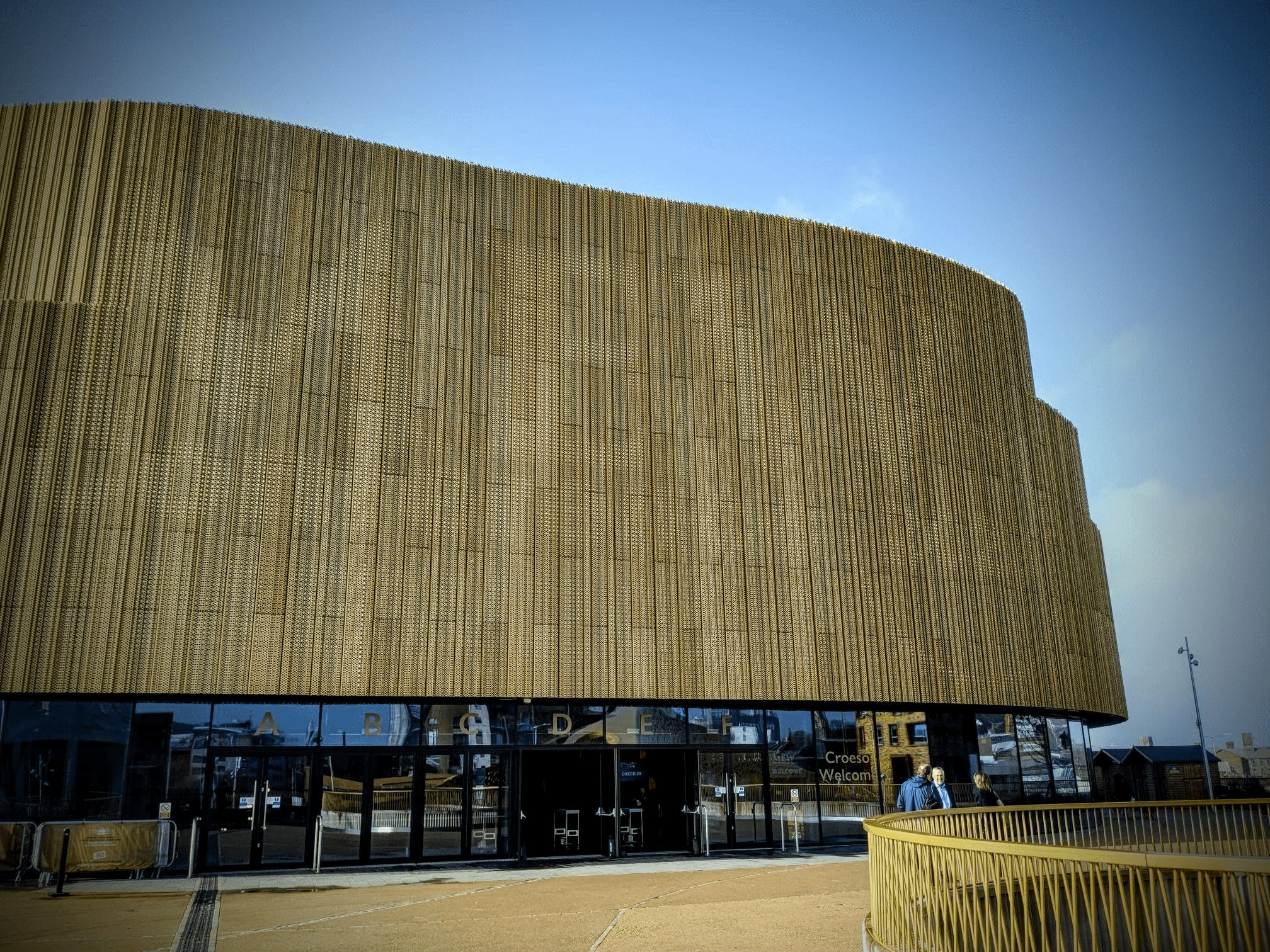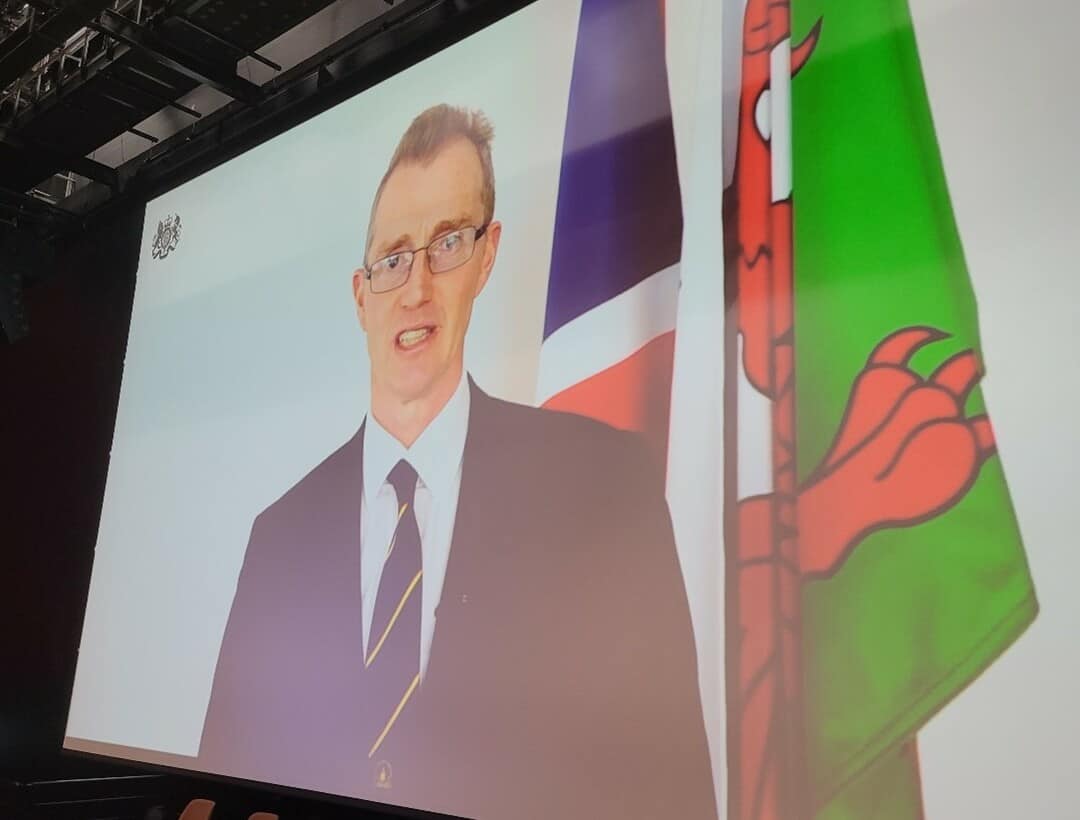The Thirty4/7 team attended the Marine Energy Wales (MEW) Conference in Swansea last week to talk all things Celtic Sea, Wales, Freeports, offshore wind and renewables. From key players in floating offshore wind, tidal energy and hydrogen to free port infrastructure and upskilling, the MEW Conference brings together a collection of trailblazing industry leaders who are striving to ensure that Wales remains a global leader in the transition to net zero.

Ports: Gateways to Industry
Port, ports, ports. It’s widely recognised that without the right port infrastructure in place, the full potential of the offshore Celtic Sea opportunities will not be realised in Wales, or even the UK.
Chaired by Gwenllian Elias, giving a developer perspective from BlueFloat Energy / Renantis Partnership, the session explored the role and opportunity that ports will play in realising the significant benefits of climate action to Wales. Panellists included Tim Morris from Associated British Ports (ABP) who outlined the ground-breaking investment in Port Talbot Freeport (subsequently announced as one of the winning Freeport bids in Wales). Equally insightful comments from Steven Edwards at Port of Milford Haven and Jim O’Toole from the Port of Mostyn underlined the need for holistic thinking and wide-ranging political support for these important infrastructure amenities to succeed.
Ultimately, the key takeaway from the session was that Freeports represent a significant opportunity to retain investment in the region and Wales as a whole. This could be momentous in supporting the move toward Wales being 100% renewable by 2035 through the decarbonisation of Welsh industry. This will also be fundamental to ensuring local communities benefit and social value improvements are felt right across Wales.
Secretary of State for Wales, David TC Davies MP: Keynote
David T C Davies, Secretary of State for Wales, sent a video message to the conference, emphasising the Government’s commitment to working with the private sector to radically expand offshore renewables, stating ‘Wales’ coastlines are home to enormous marine energy potential with some of the best regions for the development of tidal stream, floating offshore wind, tidal range and wave technologies.’
Davies highlighted the UK Government’s first annual auction of the Contracts for Difference scheme, with £205 million allocated last week to the development and deployment of low carbon electricity. Davies also stressed his support for innovative tidal stream technologies, noting that £10 million was ringfenced in this year’s Allocation Round.
The Secretary of State further announced the creation of a £160 million Floating Offshore Wind Manufacturing Investment Scheme to support investment in the Celtic Sea and Welsh ports. This investment, Davies noted, would be in addition to the £20 million delivered towards the renovation of the breakwater at the Port of Holyhead to allow for trade to continue to flow.
In conclusion, Davies stated that ‘Wales can be world leading in marine energy’ by ‘capitalising on 1200 kilometres of coastline to create a successful, decarbonised future whilst driving prosperity.’


First Minister of Wales, Mark Drakeford MS: Keynote
First Minister Mark Drakeford opened his speech by referencing the decision by the Welsh Government and Natural Resources Wales to give planning consent to Erebus – Wales’ first floating windfarm, with the capacity for nearly 100MW of generating power. Drakeford continued that the project would send an important message about Wales’ commitment to the renewables industry whilst simultaneously demonstrating the government’s promise to ensure the protection of the natural environment. This was evidenced, Drakeford later noted, by the Wales Marine Plan (2019) which outlined the balance between offshore renewable development and marine conservation.
Drakeford continued: ‘This is a government which itself previously demonstrated the success that comes when you are able to support new and latent technologies in that formative stage – look at what’s happened in solar…onshore wind…without the investment, the Contracts for Difference investment, which was provided in the early stages, we would never be where we are with those industries today and the case we make to the UK government is to do the same thing in relation to green energy, floating offshore wind…and if we can do that, then of course this is just the start.’
The First Minister praised the identification of 4GW of seabed licenses in the Celtic Sea by the Crown Estate, with the potential to power 4 million homes, but countenanced that more work was needed.
‘[W]e need the Crown Estate to provide clarity to project developers and investors of when the additional 20GW of seabed licensing will come…because it is only when investors see potential on that scale that they are likely to be able to provide that investment which is waiting there to be provided. And when that happens, we are absolutely determined here in Wales that we will not collude in the mistakes of the past in which we develop all the intellectual property, we foot all the effort into the research and the development of new technologies and then find that the manufacturing jobs and the servicing jobs and the large-scale economic benefits are offshored somewhere else instead and we become somewhere that simply imports equipment and expertise. We believe that provided we can get the help we need from the Crown Estate, from the UK government, provided there are strong and binding supply chain development plans, as part of the seabed licensing process and the Contracts for Difference, if we can get all of that lined up, then we will, not simply, as I said, make our contribution to climate change buying the energy security that our citizens need, but unlock both economic opportunities that this industry now has within its grasp.’
Praising the work of Julie James MS, Climate Change Minister, in bringing forward marine development opportunities, Drakeford urged industry leaders to come forward and provide their expertise to support the development of a sustainable marine planning system. This, the First Minister noted, would include the mapping of Strategic Resource Areas (SRAs) for wave and tidal energy, as well as floating offshore wind. James will then bring forward potential SRAs for public consultation later this year, wherein industry will have a chance to provide their technical expertise.
The First Minister next turned to the task of net zero infrastructure, notably ports, and the need to work collaboratively, not competitively, with other governments and industries. A major concern for the Welsh Government was also grid connectivity, with difficulties exporting Celtic Sea generated energy to the mainland; Drakeford argued that the cause of such difficulties stemmed from the failure of public interests to be sufficiently represented in the system.
‘So we need a different approach to the National Grid; we need one that anticipates demand, which recognises that the strength of a public interest requires investment on the different sort, of a different scale, in order to be able to take advantage of everything you are talking about in this conference.’
Finally, the First Minister turned to the ‘enormous potential’ of tidal energy and announced the launch of the next step of the Welsh Government’s Tidal Lagoon Challenge, with applications opening at the end of the year. The purpose of the fund would be to support innovative research projects which tackle the practical delivery of tidal lagoon energy, with up to £750,000 of new funding available over the next two years. Applicants, Drakeford noted, would be chosen on the basis of whether their respective projects can deepen governmental knowledge as to how the deliverability of tidal lagoon energy can be taken forward.
Concluding his speech, the First Minister praised the overwhelming opportunities available to Wales and called for the realisation of a future for the younger generation ‘in which the fragile nature of our planet has been properly addressed; in which they can rely on a supply of energy without it being vulnerable to bad actors elsewhere in the world; and where their own individual economic futures can be invested in an industry that will make a difference in so many parts of Wales.’